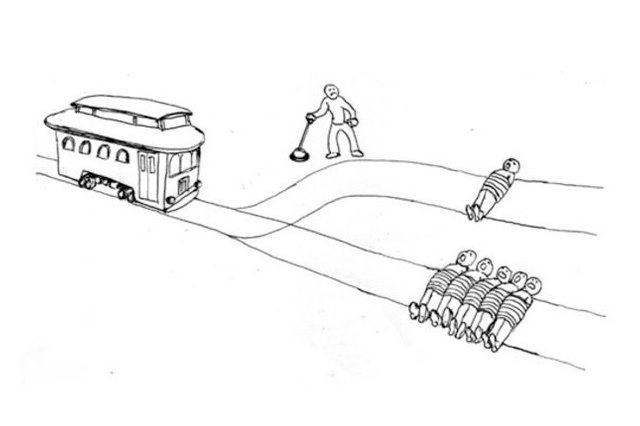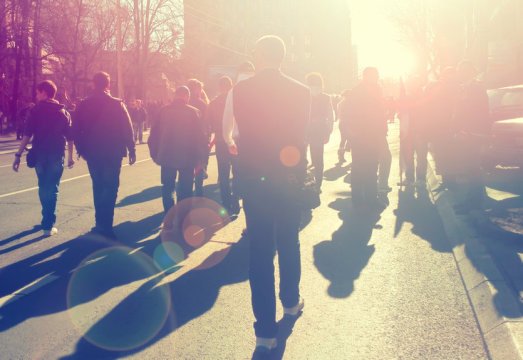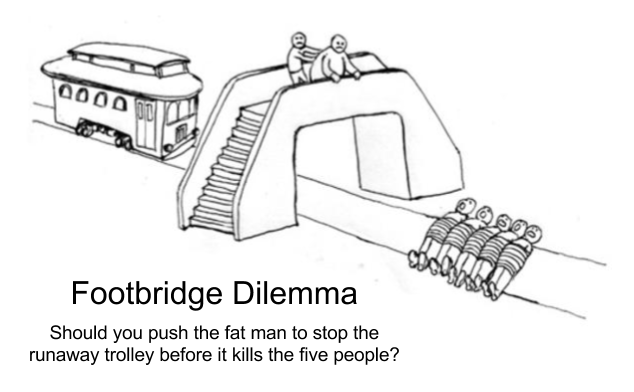What do you do when you face a dilemma?
Once in class, the professor gave us such a question:

Obviously, this is a difficult choice, no matter what we choose, it will never be the best answer.
In fact, this problem came from a famous experiment of ethical thought-"trolley problem".
The "trolley problem" was first proposed by the philosopher, Philippa Foot, to criticize the main points of the ethical philosophy at the time, led by utilitarianism.
From a utilitarian point of view, five people should be saved, because, in quantitative terms, saving five people are worth than saving one person.
But from a moral point of view, even if you save those five people and let another person die, you will still blame yourself for not saving that person.
The Philosopher uses “trolley problem” as an example to show that real-life conditions sometimes forcing a person to go against his own moral norms, and there is a situation where there is no complete moral practice.
And the intent of moralization, when facing such a dilemma, the best choice is to do nothing.

What exactly should we do? It doesn't seem to have a perfect answer.
Maybe giving up one person's life and saving five others looks great, but would you do that if the person who had to die on that track was your own family?
Of course, everyone has their own choices.
It's more complicated than the choices and judgments we usually make, so we need to think deeply.
The question the professor gave us was not exactly the same as this one. The conditions have changed a bit, and those few people are not tied to the track.
So there's a new condition: If the five people and the other person are not tied on the track, but they stand on the track for some reason, now the train is coming. So, now you have to make a choice, how will you choose?
At first, I will think like utilitarianism, fell like I should sacrifice that one person to save more people, but after some thinking, I hesitated, isn’t that the person's life is also life?
A few students answered the question, and one of the answers made me have deep thinking. He said he will keep the track as it is because it's the rule. I thought about it for a moment, and I think it was reasonable.
In the limited context presented by the picture, the group appeared on the track where the train was running, ignoring the rules, and the people on the other track did not break the rules, so why would someone who had done nothing wrong, take on the consequences of someone else's breach of the rules, in order to save more people's lives? This can't help but make a shock to the heart.
In fact, this thought experiment can be extended, replaced into a social problem, torturing us if it is the majority of people who break the rules and want them to bear their own fruit or not.

To see this problem in real life, we may easily say that they should pay the price for breaking the rules, but in fact, many times, we unknowingly in the interests of the majority, protected the people who would have done wrong. For example, two children in the family are quarreling, we all know who did wrong, but for a moment of harmony, we will ask the child that did nothing wrong to apologize, just because he is more sensible.
Speaking of which, perhaps the “trolley problem” is a bit far away, but there is a need to think about the problem, thinking is the divergence of thinking, to find out the problem. What I want to say is that this question of thought may reflect some social phenomena.
An idea, an act, can infect a group of people, and form an ethos, and then lead to some kind of common problems.
The trolley problem has a modified version, "Footbridge dilemma".

There was a runaway train running by, and five people were in danger standing on the track ahead. Between the train and that five people, on the footbridge, there was a strange fat man standing on the bridge. The only way to save the five men was to push the big fat man off the bridge, which would stop the train from hitting that five men.
So should this man be pushed off the bridge to save five people?
As with the previous trolley problem, this is just as difficult to make a choice, but it seems that in this case, most people will choose not to push.
Based on the psychological analysis, when facing the first situation, most will choose to switch the track, and in the second situation, most people will choose not to push the fat man. For the first case, it works like utilitarianism, while in the second case it is like a moral obligation theorist.
The difference between the two is that the first is just a switch, and the second is to kill a person with your own hands.
The teacher offered a train of thought, saying that while not pushing the fat man down, the tram would crush five people, but I didn't need to be responsible on the bridge. But if I push that fat man, although I saved five people, I was guilty of intentional homicide. To push or not to push, and then there's the answer.
I also have my own ideas, and I'm not going to push. Because I don't think I'm qualified to make a decision for that fat man. Whether or not to save those five people, the decision is not on me at all. Even if I want to save those five people, I have no reason to use other people lives to save them.
I began to think about whether the value of life should be measured in quantitative terms. My conclusion is that we shouldn't, because it doesn't make sense that the lives of five people are more valuable than a person's life. Above all, we are not qualified to judge the value of other people’s lives.


Posted from my blog with SteemPress : http://walkinharmony.vornix.blog/2019/01/23/what-do-you-do-when-you-face-a-dilemma/